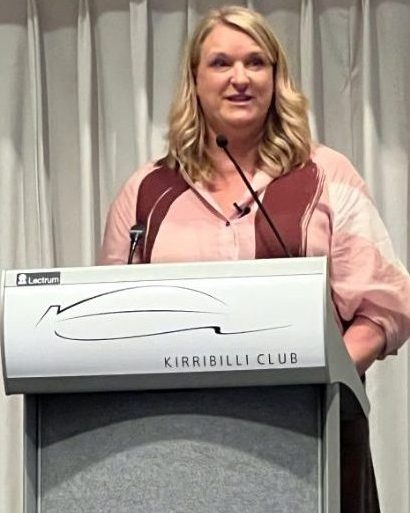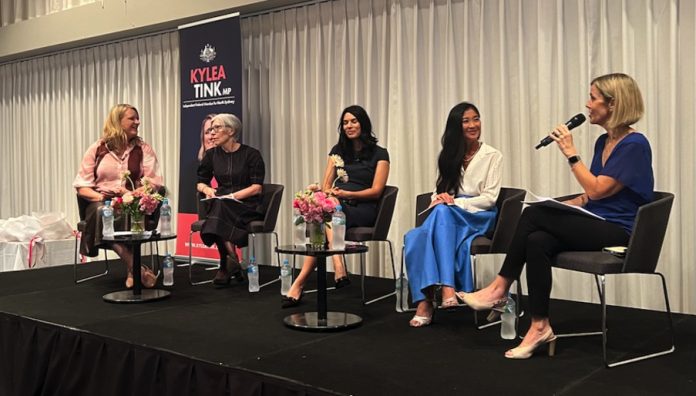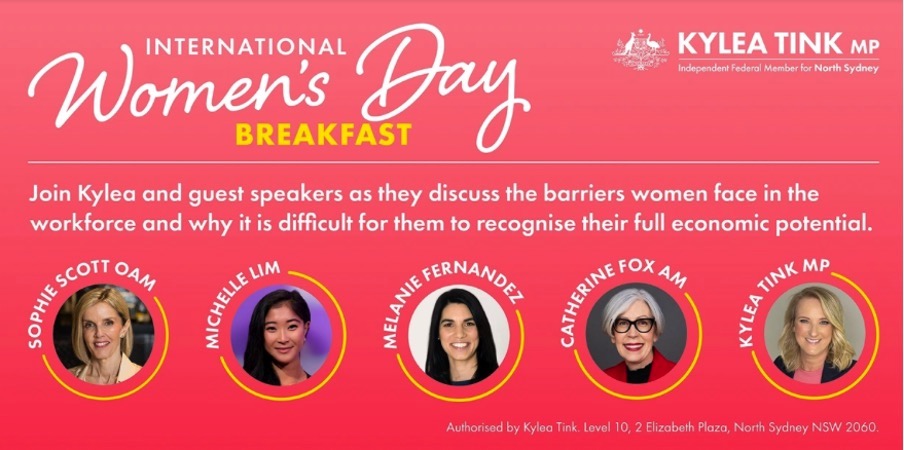Women’s achievements, their economic potential and persistent inequalities, came under the spotlight when Independent federal MP for North Sydney Kylea Tink addressed an International Women’s Day forum on March 6. Joining her at the Kirribilli Club event were influential women and community leaders.
Speakers included Catherine Fox, a journalist, author, and Board Member at Australians Investing in Women; Michelle Lim (林敏诗), Organisational Culture and Change Lead at the Reserve Bank Australia (RBA); Melanie Fernandez, GM Policy, Communications, and Research at Chief Executive Women (CEW); and Sophie Scott, a reporter and international keynote speaker.
Scott, former medical reporter for the ABC and speaker on emotional well-being, chaired the panel discussion.
The speakers covered a wide range of topics such as equal pay for equal work legislation and pay transparency measures as essential for reducing the wage gap. Discussion also included the need for subsidised childcare, flexible work policies and extended parental leave work to support women’s workforce participation, and mitigate the effects of caregiving responsibilities on their earnings.
They suggested that mandatory pay reporting could hold companies accountable for their gender pay gaps and encouraged gender-sensitive education and training programs that can empower women to negotiate fair wages.

Kylea Tink MP said women’s rights were human rights and called for a shift in mindset to address systemic inequalities.
She cited current parental leave policies, which often support only one partner who takes the most leave while the other is offered a shorter period, as an example.
“If I could become the prime minister tomorrow, I will make the two parents share it [the parental leave] equally,” said Tink.
She acknowledged that the increasing number of crossbench members made a difference in Parliament and said Independent representation changed the atmosphere of legislative debates and led to more constructive discussions.
Tink also emphasised the need to improve Question Time, which was meant to hold the government accountable but often devolved into adversarial behaviour. She said she and her crossbench colleagues were working to change the behaviour during Question Time, and aimed at a more respectful exchange of ideas.
The MP voiced her support for the Women’s Economic Equality Taskforce (WEET) report: “Purposefully removing the persistent and pervasive barriers to women’s full and equal participation in economic activity, could make us earn $128 billion more annually.”
This view was widely shared on the panel.

Statistics show that the wage gap between men and women is rapidly increasing, revealing a need to address intersectional inequalities.
Melanie Fernandez said an average 25-year-old woman with one child could expect to earn $2 million less over her lifetime than a 25-year-old man with one child. Ensuring diverse representation in leadership roles was important for inclusivity and gender equality, she said.
“When we look at the top jobs, 91 per cent of CEOs are still men and in those top 300 companies there are 28 companies that have no women at all in their senior leadership teams, which is pretty shocking.”
Catherine Fox noted that women were often working within systems that excluded them, with biases in hiring and promotion processes that contributed to gender pay gaps, particularly in the caring sector.
“We’re working in systems that are not designed for us,” said Fox.
She shared the case of her son’s girlfriend, a nurse working in palliative care, who earned only $25 per hour. “It’s so staggering – the skill that she brings to that role – even this week, she’s had to deal with two deaths on her shift.”
Michelle Lim (林敏诗) said:”A big part of what we actually miss is intersectionality and the importance of measuring all of these other differences. Everyone, not just marginalised individuals, should work to make sure everyone feels included and is treated fair.”



